- Home
- Brian Falkner
Clash of Empires Page 15
Clash of Empires Read online
Page 15
“Monsieur, we do not know you,” Sofie says. “Nor do we know anything about the escape you speak of.”
“I understand,” François says. “I have come to the wrong address and I apologize for disturbing you. I am searching for a friend of mine named Willem Verheyen. Do you know anyone by this name?”
“No,” Sofie says. “But I wish you luck in finding him.”
“You must leave,” the man says, moving his head forward and checking both ends of the street.
“You are sure?” François asks. “I have an important message for him from his father.”
The man does not react to the mention of Willem’s father, but Sofie cannot avoid a slight widening of her eyes. Just the merest movement, a flicker of her eyelids, but enough to confirm to François that she knows Willem and the circumstances of his family.
“You have the wrong house,” the man says.
“Again, my apologies,” François says. “But should you, by any chance, happen to meet Willem, please let him know that his father has recovered from a long illness and is currently recuperating at the abbey in the Sonian Forest.”
“I assure you, we do not know this friend of yours, and so are unlikely to meet him,” Sofie says.
“Please do not come again,” the giant says as he closes the door.
From the house to the tavern where Baston waits is barely a few hundred meters, but François walks a long, circuitous route that takes him past two or three of Baston’s men, casually stationed in windows and doorways. If anyone was to follow him, they would see it. He cannot be too careful. Sofie Thielemans has eyes in all corners of the city.
What kind of signal they have among themselves is not visible to François, but it is there, for as he enters the tavern he is given a brief nod by a thin-faced French soldier standing just inside the door with a glass of ale that has not been touched.
François makes his way through the tavern, past a plump woman in an indelicate dress and a moneylender engaged in a furious argument with a man who smells strongly of fish. A rear door leads to the alley behind and it is there that Baston waits, while more of his men guard each end of the alley.
“It was him,” François says. “And an old lady who must be Sofie. They denied knowing Willem, as you predicted.”
“And the message you gave them was exactly as I worded it?” Baston asks.
François nods. “If they can contact Willem, they will do so. I am sure of it.”
Baston looks over François’s shoulder and François turns to see the thin-faced soldier from the tavern, who still holds his untouched glass of ale.
“Use only your best men,” Baston says to the soldier. “Watch them day and night.”
Book Two
THE MISSION
October 6–October 14, 1815
THE SIEGE OF FORT CARLISLE
Thibault walks briskly through the courtyard of Fort Carlisle, his latest conquest in Ireland, and the one from where he intends to defeat the anticipated English counterattack.
Three battlesaurs are chained to huge bolts driven into the walls. Not one bolt, but four for each of the greatjaws. The idea of one of these creatures getting loose during the night is too awful to contemplate. They do not distinguish between French and foe. They can be controlled; that is all.
They are his girls, but they are not pets. They are not tame, nor tameable.
They growl and bellow at his approach, thrashing against the chains, but the links are large and the walls are resolute. The largest of the three girls, Mathilde, snaps at him as he walks almost within range. A meter closer and her great teeth would have taken his head off. She is his favorite.
Another cannon roars in the distance and the whistle of an approaching cannonball makes Thibault look up. There is a dull thud as the ball hits low on the outer stonework of the fort, where the wall is strongest and the cannonball will do little damage. The British dare not bring their cannon any closer as that would put them within range of the fort’s cannon, so they content themselves with the occasional shot primed with extra powder for longer distance.
“They expect us to cower behind these walls while they besiege the fort,” Montenot says, emerging from a doorway. He holds a letter and the canvas pouch it arrived in. Odette, the youngest of the saurs, snuffles and snorts at his presence.
“That would be the conventional approach for a smaller force protected by stone walls.” Thibault smiles. “There are nearly six thousand troops out there, if our scouts are correct. We are vastly outnumbered.”
“But we are not a conventional force,” Montenot says.
“Indeed,” Thibault says. “And tonight the green fields of Ireland will run red with British blood.”
“And again I protest this decision,” Montenot says. “Battles are best fought in the day. Darkness only produces confusion and disorder.”
“Exactly what I am hoping for,” Thibault says. “The saurs hunt better in the dark, and the British will not be expecting it.”
“You risk the lives of our saurs,” Montenot says.
“But not unnecessarily,” Thibault says, looking back at the beasts, admiring their sheer size, their simplicity, their ferocity. “They are beautiful, are they not?”
“They have a raw power,” Montenot agrees.
“Unhampered by emotion or sentiment,” Thibault says. “Unafraid. The perfect soldier. If all my soldiers were as fearless no empire could stand against us.”
“None will,” Montenot says.
“You bring news?” Thibault asks, gesturing at the letter that Montenot holds.
Montenot glances down at it as if he has forgotten it. He nods.
“From the Sonian,” he says. “We have the name of the collaborator who helped Willem to escape.”
“Who is he?” Thibault asks.
“A she,” Montenot says. “Sofie Thielemans, a resident of Antwerp.”
“I trust that Baston is even now interrogating her,” Thibault says.
“He is not,” Montenot says, holding the letter out to Thibault, who ignores it and waits. Montenot continues. “He says she is old, and would die under torture. Instead he has set a close watch on her, in case Willem should make contact.”
“A wise choice,” Thibault says.
“And he sent François to her to see if she would reveal anything to him.”
“That was foolish,” Thibault explodes. “If he says or does anything to make her suspicious, we will lose our chance to catch the boy.”
“There is more,” Montenot says. “Sergeant Belette is dead.”
“Belette? A shame. He was a good man,” Thibault says. “How did he die?”
“By the hand of François,” Montenot says. “Who ‘rescued’ the girl, Cosette, as planned, but killed Belette in the process.”
“An accident?” Thibault asks.
“A crossbow bolt through the heart,” Montenot says. “It was no accident.”
“Then why?” Thibault asks. “Baston said François was under control and doing as he was asked. Baston is a good soldier, but caution and intrigue are not his strengths. I will have to return as soon as this battle is won.”
There are other reasons why he must return, but they are not to be spoken in the light of day.
“If I may speak in Baston’s defense,” Montenot says. “There is only so much control with a zealot like François. His faith blinds him to all else. And…”
“What?”
“I think you should not trust him,” Montenot says.
“Why do you say this?”
“We know that he regards Napoléon as being sent by God,” Montenot says. “But once when I mentioned your name, behind my back he made the sign of the cross. One of my guards saw it.”
“He thinks me the devil?” Thibault asks.
“So it would seem,” Montenot says. “I believe that as much as he wants to help Napoléon, he looks for an opportunity to kill you. Be careful, General.”
Thibault smile
s. “This is his folly and his conceit, in thinking that I can be killed.”
“Any man can be killed,” Montenot says.
“The angel of death has already taken his chance and lost,” Thibault says, gesturing at his scarred face with his mangled arm.
The lone British cannon sounds again and the whistle of the cannonball is followed by another dull thud in the distance. This shot has not even reached the walls.
Thibault turns abruptly and climbs a ladder to a wooden catwalk that has been erected around the inner wall of the courtyard. From the catwalk a wooden frame extends over the back of each battlesaur and he lithely steps out and onto the back of Mathilde. She stirs and growls softly but otherwise does not object as he settles into the saddle and takes hold of the thin leather straps that will guide the great beast. He ties one of the straps to a clasp on the stump of his arm, before taking the other strap in his one good hand.
“You will ride her yourself, into the thick of battle?” Montenot asks.
“The British troops know of me,” Thibault says. “I am told they fear me even more than my battlesaurs.”
“And if you should be killed in this inconsequential action?” Montenot asks.
“As I have already said,” Thibault says. “The angel of death dares not touch me.”
“As you say,” Montenot says, lowering his eyes.
“Call the other riders, Montenot,” Thibault pats the neck of his mount. “Night is falling.”
SMUGGLERS
Willem is examining a metal cylinder when the boat lurches, dropping into what feels like a huge hole in the sea. He clenches his lips tightly together to stop himself from vomiting. That has been a possibility since they left London the previous day.
The River Thames was smooth and pleasant sailing, but once they reached the open Channel the waters turned rough and his stomach started to churn. He ate nothing and only took sips of water, trying to ignore the nausea, but with little success.
The boat is a sloop, unarmed. A smuggler’s ship. She is nothing like the last ship he was on, a full ship of the line of the Royal Navy, although he remembers little of that after the explosion on the Epaulette.
Yesterday they rendezvoused with another Royal Navy ship, an eighty-gunner, and spent the night moored to her side.
That had not helped Willem’s stomach at all, as the night had been one of rolling and tossing, and he had very little sleep. As sorry as he felt for himself, though, at least he could go on deck and take in fresh air. The fifty soldiers of the First Foot Guards on the deck below had no such opportunity; they had to remain out of sight and so had to simply endure what to Willem would have been insufferable conditions.
This morning they sailed to within sight of the Dutch coast and anchored there until the sun slithered below the horizon. Now, with light from only the stars and a slim, crescent-shaped moon, they are in the last stage of their journey, a perilous nighttime passage of the Oosterschelde, the northern branch of the Schelde River.
The boat heaves back up out of the hole and settles, and Willem replaces the cylinder in an oilcloth, then in a leather satchel he has brought to carry them.
These are devices of magic, what his father called a “thundercloud.” But his father’s were the size of a thimble, for use on a stage. Willem’s versions are much larger. They are made from cut-down rocket casings, by the workshops of Sir William Congreve. He hopes he will not need them.
He wonders how Congreve has fared in Ireland, and fears it was not well.
Now he opens a wooden case and examines what lies inside. It is a red rocket, as is its twin next to it. A spare, in case the first one does not fire. A second case has two green rockets and a third case has yellow ones. They are in the hold, covered by bales of sheep’s wool.
For all his doubts about Sir Congreve, Willem has to admire the speed at which he was able to blend Willem’s colored powders with the gunpowder of the parachute flare rockets.
They tested them a few days earlier and the rockets produced a sizzling, colorful display that was visible for many kilometers, even during the day.
For his part, Congreve graciously took heed of some of Willem’s suggestions. He seemed more amiable and amenable to the Calais plan once he knew his precious rockets would be put into action against the battlesaurs in Ireland.
Six rockets. Three colors.
If all goes to plan, then Blücher’s army will have approached within sight of Calais.
When the dinosaurs in the city are dead, a yellow rocket will be fired, the signal for Blücher’s army to attack.
Once Napoléon’s Grande Armée is engaged in battle at Calais against the Prussians, without battlesaurs, a green rocket will be fired, a signal for the ships of the Royal Navy waiting off the coast. They will immediately set sail to Ireland. Once they arrive at Cork Harbour, they will engage the French forces there, defeat them, and then sail back before a saur-less Napoléon is able to disengage his army from the Prussians.
The red rocket is in case of disaster. If all goes wrong, it will be used to recall the Royal Navy. It will have to be fired before they sail out of sight.
Willem hopes he will not have to use that rocket. He closes the wooden case and heaps bales of wool on top of it, then climbs the narrow ladder to the deck.
The smell of the sea never ceases to amaze him, full of mystery. The thought that this water is deep and wide enough to swallow his entire village a million times over is hard to comprehend. The air here is different from that of the forest, which was full of leafy, earthy smells. This is a harsh tang, a bitter taste on his tongue, and yet it is a fresh smell, as though the world is new and he is witness to its birth.
The wind is also different at sea than on land. It brings spray from the front of the boat, a thousand icy needles in the cold cloth of this October night.
But most of all what he notices is the silence. London is a noisy place; the air is filled with carriage wheels rattling on cobblestones, vendors shouting out their wares, constant chatter of thousands of people. Here, apart from the sound of the hull burrowing through the water and the breeze rustling the rigging, it is silent.
He turns up the collar on his coat against the spray and walks forward. He passes Big Joe, Gilbert, and Weiner engaged in earnest conversation at the larboard gunwales. He nods and smiles, but it is a strange feeling seeing them in French uniform. He knows and trusts these men, yet the uniform makes him shudder.
He wonders what it is like for them, to be wearing the uniform of the enemy. It must not be a comfortable feeling, for more than one reason. If they are caught, they will be shot as spies.
He, Frost, Jack, and Héloïse wear civilian clothes for their journey to Gaillemarde.
He finds Frost and Jack seated at the bow, their backs to the railing, talking quietly. Willem joins them and finds himself in the midst of an uncomfortable silence.
“A private conversation?” he asks.
Frost shakes his head. “I was just asking Jack about Bedlam.”
Willem glances at Jack, who shudders.
There is a touch on Willem’s arm and he looks around to see Héloïse sliding down next to him. She puts her arm around his waist and rests her head on his shoulder. After a moment he decides that she must be cold, and he places his arm around her shoulders to keep her warm.
It is certainly not appropriate behavior for an unbetrothed young man and woman, but Héloïse, Willem reminds himself, is not privy to the usual mores and manners of polite society. And besides, she is cold.
“What did Jack say?” Willem asks.
Frost shakes his head. “It is, perhaps, a sensitive subject.”
“It’s a bad place,” Jack says uncertainly.
“You had been to Bedlam before?” Willem asks.
“I didn’t know what it was called until we got there,” Jack says. “I recognized the statues out front. Nobody could never forget them, could they, sir?”
An image comes to Willem’s mind of the
contorted faces of the two reclining lunatics outside the asylum. He shudders also.
“I mean, who would put statues like that outside a place what’s supposed to be helping people get better?” Jack asks.
“Why were you there, Jack?” Frost asks. “Did you live there for a while?”
“Oh no, sir, nothing like that,” Jack says. “I was visiting me mum.”
A bad memory seems to settle over him like a dark cloud. He shuts his eyes briefly.
“What happened, Jack?” Frost asks.
“It were after me dad died,” Jack says. “He were at the Battle of Trafalgar. He got hit by a cannonball. In the … here.” He pats his chest. “He lay next to Lord Nelson himself, so I heard.”
“I remember you telling me,” Frost says.
“He was on the Victory, that was Nelson’s ship, sir,” Jack says. “That’s why he was in the ship’s hospital next to him. I mean after Nelson got himself shot.”
“That was 1805,” Frost says. “You must have been about seven.”
Jack holds up his hands, counting on his fingers for a moment, then gives up.
“Something like that,” he says. “After that me mum went a bit odd-like. She wouldn’t eat or drink. Wouldn’t even talk. Not even to me. She just sat in the corner until the doctors came.”
“What happened to you?”
“A family from the church took me in,” Jack says. “They were good people. It was them what took me to see me mum.”
The dark cloud that hovers over Jack has intensified.
“You don’t have to talk about this,” Willem says, but Jack does not seem to hear.
“I remember crying. There was an orderly, a big, fat orderly with piggy nostrils. He was shouting at me, shouting and shouting. I was running. There was a balcony. And an old man, with red, red eyes. There was someone screaming.” He pauses. “Might have been me, sir. I remember falling.”
“Then what, Jack?” Frost asks.
“Hospital, sir. I was there for a long time. The doctors were saying stuff about my head. Didn’t make no sense to me.”

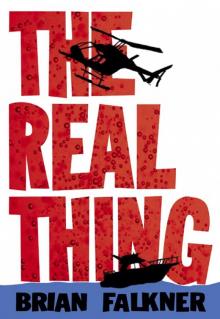 The Real Thing
The Real Thing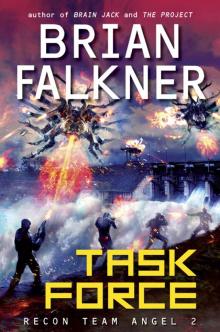 Task Force
Task Force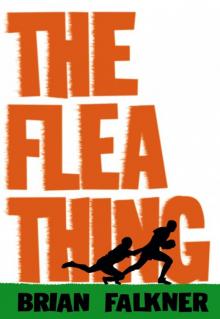 The Flea Thing
The Flea Thing The Project
The Project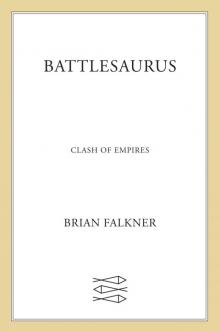 Clash of Empires
Clash of Empires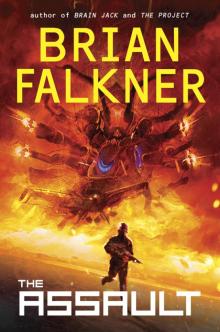 The Assault
The Assault Brain Jack
Brain Jack The Tomorrow Code
The Tomorrow Code Vengeance
Vengeance The Super Freak
The Super Freak Northwood
Northwood Cave Dogs (Pachacuta Book 1)
Cave Dogs (Pachacuta Book 1)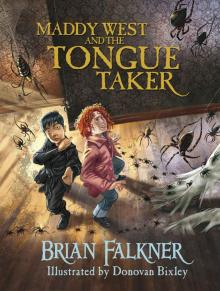 Maddy West and the Tongue Taker
Maddy West and the Tongue Taker